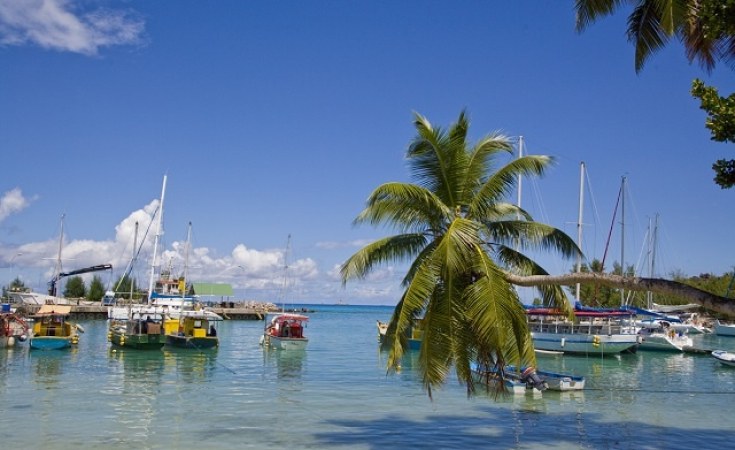The two continents share maritime spaces. An agreement on equitable and joint responsibilities could boost development and prosperity.
World Oceans Day on 8 June is an opportunity to reflect on the ocean's vital role in sustainable development, food security and climate change resilience. All of these are imperative for Africa, which is highly susceptible to the damage wrought by climate change.
Safeguarding the oceans is a collective responsibility that could draw Africa and Europe closer together. The foundation for cooperation is well established, but both continents' commissions and member states have several barriers to overcome. Blue economies also need more prominence in their existing partnership.
Multinational cooperation on ocean health delivered a landmark achievement this year. In March, United Nations (UN) member states concluded the global High Seas Treaty to protect biodiversity in waters beyond national jurisdiction. This demonstrated a shift in thinking away from the 'free seas' concept and the reckless exploitation that resulted, towards conservation and concern about harmful practices.
The treaty shows that countries recognise the need for cooperation to protect the 'common heritage of humankind,' as stipulated in the UN Convention on the Law of the Sea. With over 60% of the ocean lying outside countries' jurisdiction, this space represents perhaps the most interconnected single ecosystem on the planet. Shared responsibility for the governance of ocean resources is necessary for sustainable development and climate action.The foundation for AU-EU cooperation is well established, but several barriers need to be overcome
African countries played a prominent role in this positive step, and many are enthusiastic about ocean governance, including taking regional and global leadership roles. This corresponds with the continent's growing recognition of the blue economy as an avenue for economic growth, climate resilience and poverty alleviation in Africa. Partners outside the region will be key to achieving these outcomes.
In April, African Union (AU) Commissioner for Agriculture, Rural Development, Blue Economy and Sustainable Environment Josefa Sacko, highlighted the importance of enhancing cross-continental cooperation on the blue economy. In particular, she noted the need 'to strengthen [Africa's] partnership with Europe, to identify areas of joint work that can reinforce existing collaboration.'
Closer AU-European Union (EU) ties make sense, as cooperation is already happening in other sectors, like health, security and development. And their blue economy approaches have complementary strengths that can be mutually beneficial. Furthermore, the two regions' shared maritime spaces and interconnected ecosystems serve as natural strategic areas for joint efforts.
Several African blue economy projects have already received substantial EU support. Kenya's Go Blue initiative links sea-land development by promoting the inclusion of women and youth in the ocean economy. The goal is to improve coastal infrastructure, economic growth, marine conservation and maritime governance.
The need for a cross-continental blue economy partnership is clear when considering transboundary threats such as illegal, unreported and unregulated (IUU) fishing, rising sea levels, pollution and biodiversity loss.
However, several obstacles hinder cooperation. First, there is a discrepancy between the stated strategic and shared interests in the conservation and management of ocean resources and the realities of illegal fishing in African waters. EU member states' fishing boats have often been implicated in illegal fishing in African waters, depriving communities of their livelihoods and forcing them to take greater risks while fishing.
Harmful fisheries subsidies are also an issue, despite a deal struck last year at the World Trade Organization. And the continued lack of transparency in the fishing sector enables illegal fishing. For instance, the EU has negotiated numerous agreements with non-EU states under its sustainable fisheries partnerships. Although these deals are rooted in sustainability, they have been criticised for loopholes that allow EU vessel owners to hide their ownership and avoid responsibility.
The second obstacle facing the AU-EU relationship is its asymmetrical nature. Many African countries lag behind in maritime governance. Their institutional challenges and a misalignment in blue economy aims and progress mean the partnership might benefit Europe disproportionately.The unbalanced relationship could also manifest in other ways. The EU was recently accused of using aid to pressure an African country to withdraw a proposal that would impact EU tuna fishing companies in the Indian Ocean. The EU denies this, but the bloc may struggle to balance its long-term sustainability goals with member states' short-term business interests. Added to that is the lack of resources or political will among African countries to detect and prosecute offenders in African waters.
At the 2022 sixth AU-EU summit, leaders committed to a 2030 vision on peace and security, migration and mobility, energy security and a green transition, supported through the Global Gateway Africa-Europe Investment Package. The blue economy wasn't explicitly mentioned, but that is likely to change given the impetus for multinational ocean action and implementation of the new High Seas Treaty.
Oceans are essential and cross-cutting for each UN Sustainable Development Goal - not just SDG 14, which encompasses sea conservation. Both Africa and Europe stand to gain from a partnership that includes the blue economy. Tangible progress will however require more than just summit diplomacy.
Both parties must share responsibilities and benefits. That requires transparency, acknowledging each other's strengths and weaknesses, and focusing on a blue future that delivers prosperity for all.
Denys Reva, Researcher and David Willima, Research Officer, Maritime, ISS Pretoria


